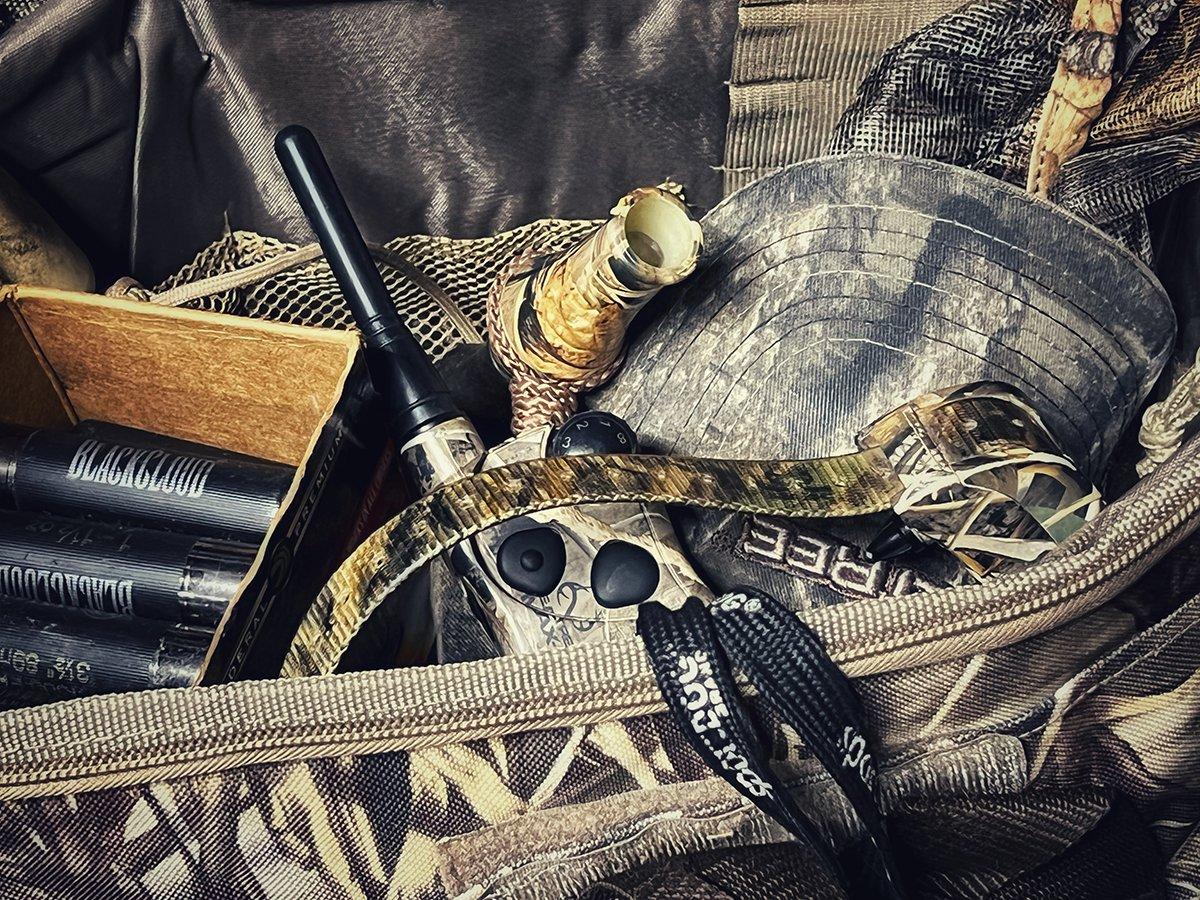Forgetting these items in the marsh or timber can create headaches
Gear-related articles provide good insights about essential equipment, but they're also subjective and depend greatly on hunting situations. For example, I have four blind bags I use frequently during duck season, and each contains essential stuff for a specific style of hunting.
Still, let's agree that some equipment is mandatory for almost any type of duck hunting. And other gear, although perhaps not required, can prove helpful some days. So with that in mind, let's look at some stuff I always tote during duck hunts, whether I'm plying open water, hunkering in a dry field, hunting in a comfortable blind, or walking into nasty cover.
Headlamp: This is a no-brainer, but if you've ever forgotten your light and tried to set up in the dark, you know how important it is. I misplaced mine a few weeks ago and was rewarded with a stick in my eye while walking to a pothole.
Toilet paper: You never know. Enough said.
Game strap: These are essential for walk-in hunts, as they let you secure birds together and sling them over your neck or shoulder for the trip out. If you've ever tried to lug six ducks by grabbing their feet or necks, you recognize the value of a strap. Totes might not seem that important when hunting from a boat or blind, but they still let you organize birds and separate individual limits.
Waterproof decoy gloves: Picking up decoys sans gloves often results in numb, stinging fingers. Conversely, standard hunting gloves turn into sodden lumps of junk when you wear them while grabbing wet blocks. Lighter PVC-coated decoy gloves solve the dilemma, protecting your hands from frigid water, allowing greater dexterity, and providing some degree of insulation. I prefer elbow-length models to protect your sleeves from getting wet.
Plastic shell boxes: Having fired a few dud shells through the years, likely caused by moisture and corrosion, I always carry ammo in waterproof plastic cases. This protects them from the elements and still allows easy access. Some guys prefer neoprene shell belts, and that's cool. As a compromise, I'll throw a few extra shells in my front wader pocket so I can grab them quickly if early-morning action is hot.
Extra shells: During most duck hunts, you won't need a full box of shells. If I burn through more, it's been a memorable day, or I've shot extremely poorly — or both. Still, toting an extra box of shells can save the day if you or a buddy run low. They add more weight, but it's worth the hassle for those days when there seems to be a lot of air around ducks. And for diver hunting, I bring a box of cripple shells with smaller shot — even Nos. 5 or 6 steel — than standard loads. They provide a denser pattern for finishing headshots, and you won't burn through your regular shells while dispatching cripples.
Face paint or a facemask: Most duck hunters realize the importance of covering their shiny mugs, but some ignore it. And if you're hunting pressured birds during tough conditions, everyone in the party should cover their face. Haul a small tub of face paint or an extra mask just in case. They add little weight but can really boost your odds.
Rangefinder: Deer and turkey hunters typically tote rangefinders afield, but most duck hunters don't. Maybe it's because experience has given us a mental picture of when birds are in range. However, it can sometimes be difficult to accurately judge the distance of a moving object — like a bluebill blazing by at Mach 2 — especially on open water. If nothing else, a rangefinder can eliminate doubt about the distance from your blind to the farthest decoys and beyond. And in tight-cover situations, a rangefinder lets you know the specific distance to visible landmarks, removing confusion about when to call the shot or let birds pass.
Canine essentials: Hopefully, you'll never have to use a first-aid kit for your retriever. But hard experience has taught most of us that you need to carry one afield. You do not want to be empty-handed if Rover rips a hole in his chest while you're a half-mile from the road or 20 minutes from the landing. A simple kit with EMT gel, antibiotic ointment, an antiseptic rinse, a small pliers, and gauze or bandages can help your dog through many common injuries until you get to a veterinarian. And don't forget to bring plenty of water for your pooch, especially during warm conditions.
(Don't miss: Season Splits: Do They Help Duck Hunters?)
Click here for more Realtree waterfowl hunting content, and check us out on Facebook.








